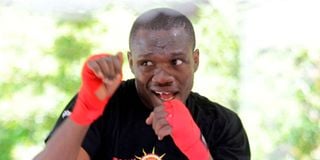
Middleweight boxer Rayton Okwiri works out at AV Fitness gym at Kileleshwa, Nairobi on February 21, 2023.
Rayton Okwiri bursts into Room 108 at Kenya Prisons Service’s Magereza House headquarters, bedecked with a collection of glittering medals, two heavy boxing title belts weighing down his broad, strong shoulders.
“Pole nimechelewa kidogo… nilikuwa shughuli but ilibidi nifike hii interview (sorry I’m a bit late… I was engaged somewhere but I had to turn up for this interview,” he excuses himself.
And after exchanging pleasantries, he wastes no further time: “This one is from the Challenge Cup in Germany… this one I won at the Africa Championships in 2016 and qualified for the (Rio) Olympics… this bronze I won in Pakistan at the Benazir Bhutto Championship… this one is Kenya’s only medal from the 2011 All African Games… this gold medal is from a tournament I won in Colombo, Sri Lanka… then these two are from the Soya awards,” he runs through his impressive medal collection.
Before turning to the belts: “This is the African Boxing Union title belt and this other one is from the World Alliance Boxing Association… I’m a four-time African champion and an Olympian,” he says with a deep sense of pride.
In the boxing ring, Okwiri takes no prisoners. But off the ring, the Prisons fighter - nicknamed “Boom Boom” for his attacking style – does take prisoners, due to his job as a Kenya Prisons Service officer.
The Africa Boxing Union middleweight champion owes his success to the Kenya Prisons Service, having served in the green uniform for the last 18 years, attached to the Nairobi Remand Prison at Industrial Area.
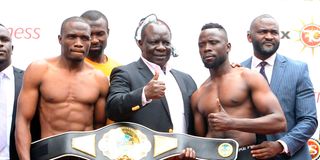
Kenya’s Rayton Okwiri (left) and Chikondo Makawa of Malawi joined by Kenya Professional Boxing Commission chairman Reuben Ndolo (centre) and Cliff Mboya, General Manager Finix Sports during the weigh-in on September 8, 2023.
Senior Superintendent Okwiri tells me how he was cradle-snatched by Prisons, even before he has his Form Four examinations at Mombasa’s Serani Secondary School, and spirited to the Prisons Staff Training College in Ruiru to train with the wardens.
Aged 38, he credits his boxing success to the support he has received at the Kenya Prisons Service.
“It is because of the Kenya Prisons Service that I’m whom I am today. Most boxers fail to get to my level because you can’t hustle and at the same time go for intense training,” the southpaw fighter explains.
“I usually wake up as early as 3am for a run, then gym, rest and evening back to gym, going to bed early, by 8pm. When will you get time to engage in another job? But at the Kenya Prisons Service, they release sportspeople for training, just like they do at the National Police Service.
“We perform well because we get enough time to train and I’m very grateful to the Prisons Service because without them, I wouldn’t have been a champion. They have held my hand and made me who I am.
“Usually when I have fights, the prisons staff always attend, some in uniform, and this gives me morale,” says the father of five boys, himself the only child in his family, and sole breadwinner.
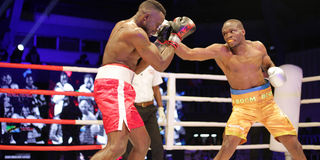
Kenya's Rayton Okwiri (right) lands a right on Malawi's Chikodi Makwa during their Waba Supreme Africa Middleweight title at the Nyayo National Stadium on September 9, 2023.
“At Prisons, we offer all support needed for our sportspeople and will continue to do so. We are happy with Rayton’s achievements and will continue supporting him,” Bernard Otoo, the Secretary General of the Kenya Prisons Boxing Association, assures.
How it started
Okwiri’s love for boxing started while he was still in primary school at Ziwani Primary School in Mombasa’s Sparki area. He would sneak to the Kenya Ports Authority gym in Makande to admire multi-weight fighter Evans Ashira Oure’s routine.
“Oure inspired me… I used to look up to him and admire his success in the ring and his travels to the Commonwealth Games, Olympics and other competitions,” Okwiri reflects in our interview at Magereza House.
“I used to tell my friends ‘where this guy has been to, I will also go.’ And, to be honest, wherever he went, I have been to,” Oure adds, heaving a sigh of satisfaction.
“Even in pro boxing, I’m almost surpassing his achievements… Because when he retired, he had three stars in boxing, and I currently have two-and-a-half stars. I’m the only Kenyan with two-and-a-half stars for now.”
And, in 2004, after training seriously for just one year having taken keen interest in 2003 while in Form One, “Boom” took to the ring, sweeping all before him, winning at the novices and intermediate levels, both at the provincials and nationals.
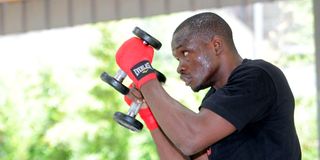
Middleweight boxer Rayton Okwiri works out at AV Fitness gym at Kileleshwa, Nairobi on February 21, 2023.
In 2005, Okwiri made his first trip beyond the borders, travelling for the “Bingwa wa Mabingwa” competition in Tanzania where he shone despite being a junior, winning the silver medal and bagging the “most promising boxer” trophy at just 19 years.

Boxer Rayton Okwiri shows his title belts and medals to fellow Kenya Prisons Service officer and former world 1,500 metres champion Timothy Cheruiyot at Magereza House. ELIAS MAKORI
“The Kenya Prisons Service took me up in 2006, just as I was about to complete my high school education. I remember leaving the Prisons Staff Training College to go and sit my exams. At the time, George Gichuki was my coach,” he recalls.
“Gichuki saw my talent and saw that I had the potential of being a champion. At Prisons, there were senior boxers who were unemployed, but Gichuki gave me a job, alongside another boxer, light flyweight Harrison Mathuku who has since retired.”
After passing out from the Prisons College, and soon after leading Kenya to three gold medals as captain at the Anoca Under-20 Championships in 2006, Okwiri caught the eye of Amateur Boxing Association of Kenya officials who invited him for senior trials in Nanyuki for the All African Games.
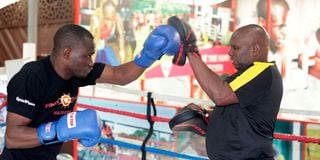
Middleweight boxer Rayton Okwiri (left) trains with his coach George Gichuki at AV Fitness gym at Kileleshwa, Nairobi on February 21, 2023.
“I beat “Black Moses” Mathenge and made the national team and I remained in the national team until 2016 when I left voluntarily after the Olympics Games (in Rio).
“For the 10 years I was the top boxer in my weight category and I have never been anyone’s sparring partner,” he prides himself.
In the 10 years with the national team, Okwiri fought in the light-welterweight, welterweight and middleweight divisions.
First major outing
It was at the 2007 All Africa Games in Algiers that “Boom Boom” made his first serious international outing, losing in the quarters with Suleiman Bilali (light flyweight) won gold and the pair of Daniel Shisia (middleweight) and Joshua Ndere (light heavyweight) taking bronze.
“It was my first international outing and the first time for me to board a plane… I performed better than experienced fighters who lost in their opening bouts.”
In 2007, Kenya’s “Hit Squad” made a return to Algeria for (Beijing) Olympic qualifiers. Bilali qualified for Beijing by bagging silver, losing to Namibia’s Commonwealth Games champion Jafet Uutoni in the final while Okwiri lost in the light welterweight quarters to Morocco’s eventual winner, Driss Mussaid, a 2006 World Junior Championships bronze medallist.
“We came back to Kenya for trials and then went to another Olympic qualifier in Namibia. Four boxers qualified for Beijing, namely Bernard Ngumba (Prisons, flyweight), Aziz Ali (Prisons, light heavyweight), Nick Abaka (Kenya Defence Forces, welterweight) and Nick Okoth (Kenya Defence Forces, featherweight).”
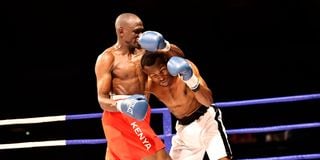
Kenya's Rayton Okwiri (left) fights against Tanzania's Shabani Ndaro during their middleweight non-title bout at KICC in Nairobi on January 14, 2023.
Okwiri lost in the quarter-finals after winning his preliminary bout.
“That’s the last time we had many boxers at the Olympics with the five qualifiers under coach George Gichuki… It’s sad that this time we had no boxer at the Olympics in Paris,” he regrets.
After the disappointment of failing to qualify, Okwiri then turned his focus on the local league and in 2009, was in the team that went to the World Championships in Italy.
“Due to inexperience, no boxer moved onto the next round – it was our first World Championship. It was a poor performance but we can’t blame anyone because it was our first time out of Africa and there was stage fright. The ring itself was intimidating and there were over 300 boxers!
“It was quite engaging because you start from the Round of 64. On to the Round of 32, Round of 16, quarters, semis and the final…. To win, you will have fought six times within two weeks. It needs a lot of experience.”
In 2010, Okwiri moved up to the “more comfortable” welterweight division for the Commonwealth Boxing Championship in Delhi, winning gold.
He returned to Delhi in July the same year for the Commonwealth Games, falling in the quarters to South Africa’s Tulani Mbenge, the current IBO welterweight champion, as Gicharu bagged bronze in the bantamweight, Kenya’s only medal at the games.
It was Okwiri’s turn to bring the only medal – a bronze – from the 2011 All Africa Games in Maputo after falling to Cameroon’s gold medallist Joseph Mulema in the semis.
“Our women’s volleyball team also won bronze, and I recall when the Prisons players from that squad came to see the Prisons boss, they were all promoted. I won bronze, just like them, but wondered why only they were promoted.
Olympic qualification journey
“In 2012, we did trials for the London Olympic qualifiers in Morocco. In the first round I met a Moroccan (Mehdi Khalsi). I felt I beat him, but he won 11-12. Fans booed the decision. I wondered to myself “My God, where have I gone wrong? Because I always gave my all…”, but coaches encouraged me, telling me I had time on my side.”
In 2012, only Benson Gicharu qualified for the Olympics after taking silver in the qualifiers. Elizabeth Andiego got a wild card entry.
In 2013, Okwiri and Gicharu were invited by AIBA (International Amateur Boxing Association) to Almaty, Kazakhstan, to camp ahead of the World Boxing Championships held in October that year at Almaty’s Baluan Sholak Palace of Culture and Sports.
“I adapted well in camp. And in my first game at the World Championships, I was up against an Australian, Daniel Lewis, whom I beat him easily, 3-0. My second fight was against a boxer from Kyrgyzstan (Erkinbek Bolotbek), a hard puncher whom I beat 3-0.
In his third fight, Okwiri met Great Britain’s 2012 Olympic silver medallist and 2011 European champion Fred Evans – who had beaten him at the Commonwealth Games in India.
“He assumed it would be an easy one. But I beat him convincingly, but being an Olympic silver medallist and myself just a bronze medallist from the African Games, the judges gave it to him after we had tied.
Evans eventually lost 3-0 to German Arajik Marutjan in the quarters.
“When I went back to the changing room, I found AIBA officials who sought to have my details. They were impressed by my performance and that’s when Gicharu and I were enlisted for the AIBA Professional Boxing (APB) fights.
“Since I fought at the 2013 World Championships, no Kenyan has beaten my record of going three fights. It is a record that’s hard to beat. I didn’t get a medal but to win a match at the World Championships is not easy,” Okwiri boasts.
AIBA Pro Boxing cameo
APB allowed one to fight pro but also represent his country on international assignments like Commonwealth Games, Olympics and All African Games.
It involved 90 of the world’s top-ranked fighters in 10 weight categories with boxers clashing over 12 rounds
“The APB was launched in Kazakhstan in 2014, and Gicharu (flyweight) and me (welterweight) were the only boxers in their category. I was ranked second in my category...”
Before making his APB pro debut, Okwiri travelled with the “Hit Squad” to Mauritius (Kenya vs Mauritius match) and Sri Lanka (Lion’s Cup) winning gold on both outings, the Sri Lanka contest the most memorable in his amateur career.
“Since I started boxing, I had never fought in front of such a large crowd! And when I fought the local fighter in front of his wild home crowd, my secret was to be aggressive from the bell and to attack,” he recalled.
“The Asian fighters have no power and my experience and aggressive attack made me overcome the crowd support.”
Fighting at the Sugathadasa Indoor Stadium in Colombo, Okwiri defeated Australia’s Kori Fano 3-0 in the preliminaries before outpunching home boxer P.D.D. Maduranga, a private at the Sri Lanka Army Ordnance Corps, also 3-0, in the quarter-finals, sailing into the final by outpointing Philipino Eumir Marcial.
In the final, Okwiri breezed past Belgian Anas Messaoudi to bag gold.
Compatriot Denis “Billabong” Okoth lost to home fighter Mohamed Dilshan to settle for silver after Simon Mulinge had bagged bronze after losing in the semis to another home fighter, Anurudha Rathnayake.
Pro fights debut
In 2014, Okwiri went back to Kazakhstan for the APB launch fights and was draw against red-hot favourite, Austria’s Marcos Nadel, one of the boxers AIBA paid to shift from full pro status, and the European Boxing Union champion with a record of 18 wins, one draw and one loss.
“They thought I would be an easy match for Marcos in the opening fights. Publicity was high and every fan in Kenya was watching,” Okwiri recalls the fight at the Sarhadchi Complex in Baku.
“It was a six-round fight. I studied him in the first round and when we got into the second, he got into my right hook and took deep sleep! Everyone at AIBA was now talking about this Kenyan boxer, Okwiri…”
The following month, Okwiri was up against a Turkish fighter, Onur Sipal, who beat him on points. “He was short and aggressive and difficult to handle.”
And in the third match, Okwiri defeated six-foot-one Russian Andrey Zamkovoi, a silver medallist in Italy in 2009 at the World Championships, qualifying for the world title fight against Turkish Sipal in December, 2014.
“He beat me on points, but we were paid well. It was my first time to handle seven figures in cash… I was paid Sh3 million for that fight.”
But after the first circle, APB started losing sponsorship and wound up in 2018 amid huge financial losses.
Rio Olympic Games
Okwiri focused on the domestic league, African competitions and qualification for the 2016 Rio Olympics.
At the Africa qualifiers for the Rio Olympics held in Cameroon, Okwiri was the top seed and landed a bye in the preliminaries where he hammered Nigerian fighter Christian Abua in the quarter-finals, defeating Ghana’s Azumah Mohammed in the semis.
“In the final, I was up against the Africa Championships silver medalist (Walid Sedik Mohamed of Egypt) whom I beat to become African champion and qualify for the Olympics. Nobody else qualified for Rio from this tournament, but Peter Mungai later got a ticket after South Africa’s Sibusiso Bandla withdrew.

Boxer Rayton Okwiri displays his title belts and medals in the company of fellow Kenya Prisons Service officer and former world 1,500 metres champion Timothy Cheruiyot at Magereza House. ELIAS MAKORI
Gicharu qualified through the final qualifiers in Venezuela where he won gold.
“My first game at the Olympics was against a Russian – silver and bronze medallist at the Olympics previously – Adrey Zamkovoy. I beat him closely 2-1 to reach the quarters where I met Morocco’s Mohammed Rabii who was the World Champion from Doha at the time. Personally I was sure I won, but Rabii was handed the win.
“After Olympics, I said to myself ‘I have achieved all an amateur should achieve’ and when Fox TV people approached me to turn pro, I accepted.
“My first fights was against a 9-1-1 boxer from Tanzania (Salehe Mkalekwa) whom I kayoed in the second round.
“In 2019, I had a World Boxing Federation title fight against a Tanzanian fighter (Meshack Mwankemwa) whom I kayoed in the third round.
In 2023, Okwiri fought for the World Alliance Boxing Association (WABA) Supreme Africa middleweight title at the Nyayo National Stadium against Malawi’s Chikondi Makawa whom he beat on a unanimous points decision.
In his 13 pro fights so far, Okwiri has won 11, drawn one and lost one.
“I lost in 2020 in South African (to DR Congo’s Ammany “General” Kalombo, my only loss in pro boxing after a seventh-round (thumb) injury that forced me to stop. I saw no need to suffer in the ring while there were many bouts ahead.
“I was given short, three-week notice for the fight and for 12-rounders, you need at least three months to prepare. I will never fight again on short notice.
Advice to upcoming boxers
“Many boxers fail because of fighting unnecessary fights. You can’t last 10 rounds without getting punched and this can lead to one getting “punch drunk.”
“You need to be wise and not be available for every other fight. You will go mad.
“I’m proud that I’m the only Kenyan boxer in the top 100 of global rankings. In 2025.”
Okwiri is of the opinion that Kenya engages foreign, experienced coaches to lift the game and teach local trainers.
“We need foreign coaches to teach modern boxing. We are still using training models from the 1980s yet boxing has advanced.”
Okwiri, who is promoted by Boston-based Michael Reyes and Jamil Rudy Neal of Mauritius, feels many young Kenyan boxers lack the discipline of training.
“They start boxing today and hope they can be champions tomorrow. I started boxing in 2003 and started shining much later, around 2011. Many boxers lack that patience. If I was to be disappointed, I would have left boxing long ago.”
Okwiri -- currently 83rd in the global boxing rankings out of 1,895 ranked fighters for his welterweight category -- hopes the Rayton Okwiri Foundation and Okwiri Management Ventures will help develop boxing talent to take after him.

Boxer Rayton Okwiri displays his title belts and medals at the Kenya Prisons Service's Magereza House headquarters recently. ELIAS MAKORI
He remains grateful to his main sponsors, Finix Casino and SportPesa, and, of course, the Kenya Prisons Service for holding his hand in a stellar career.
“This year has been great! We’re working to lock in more fights and stay busy. Now ranked 83rd on Boxrec, wait until you see where I’m heading!,” he sums it up for his fans on his socials.
Two years shy of 40, Okwiri is not about done yet.








